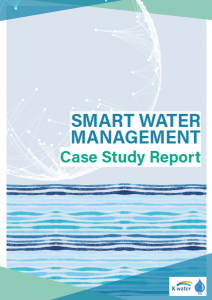IWRAプロジェクト
スマート水管理
IWRAは、スマート水管理(SWM)プロジェクトで、K-water(韓国水資源公社)、アジア水評議会(AWC)、および世界中の水専門家と協力できることを嬉しく思います。
IWRAは、SWMの利点をよりよく理解し、促進するために、スマート水管理(SWM)ケーススタディプロジェクトとスマート水都市プロジェクトの2つの大きなプロジェクトを主導してきました。スマート水管理のケーススタディプロジェクトは2017年から2018年にかけて実施され、世界中の模範的なSWMプロジェクトによって得られた知識と洞察を共有することにより、SWMの継続的な実装を促進することを目的としています。SWMケーススタディレポートの配信の成功に続いて、IWRA、K-water、およびアジア水評議会(AWC)は、2020年から2023年12月にかけてSmart WaterCitiesプロジェクトとのコラボレーションの新しいフェーズを開始することに合意しました。このプロジェクトは、世界中の都市におけるスマートウォーターテクノロジーの例を特定して調査し、スマートで持続可能な都市に適用可能な一連のグローバルスタンダードフレームワークと認証スキームを収集して分析することを目的としています。
スマートウォーターシティプロジェクト
スマートな水の都市プロジェクトは、都市開発にスマート水技術の解析に特化し3年間のプロジェクトです。2020年7月から2023年12月まで、IWRA、韓国水資源公社(K-Water)、アジア水評議会(AWC)が共同で運営しています。
このプロジェクトには3つの主な目的があります。
-
-
- 都市の水資源管理を改善するために実施されている技術的解決策、およびそれらの実施の条件(公的および私的関与と支援を含む)を特定および調査すること。
- 都市のスマートウォーターソリューションを測定および比較するために採用されている既存のグローバルスタンダードフレームワークと主要業績評価指標を特定および調査すること。
- 世界中のスマートウォーターシティのための新しい国際的に認められた認証スキームを開発すること。
- 都市の水資源管理を改善するために実施されている技術的解決策、およびそれらの実施の条件(公的および私的関与と支援を含む)を特定および調査すること。
-
なぜスマートウォーターシティなのか?
世界中の都市は革新と創造性のハブです。それらは、世界的な経済成長、貿易と金融の交換、コミュニケーションとロジスティクスの中心にあります。都市人口は増加しています。世界の人口の60%以上が、2030年までに都市に住むと予想されています。
しかし、都市の成長はすでに都市のインフラと環境に比類のない課題を投げかけています。水資源に関しては、都市の拡大により、飲料水の水質と衛生状態、雨水と漏水管理、およびコミュニティの関与と意思決定に課題が生じています。インテリジェントテクノロジーの開発は、言葉の周りの都市における既存および今後の都市の課題の両方に対処するために提案されたソリューションの最前線にあります。「スマートシティ」は有望な目標となっています。
この研究プロジェクトは、都市開発でSWMテクノロジーを採用する際の特殊性と特定の課題を明らかにすることを目的としています。このトピックに取り組んでいる世界中の研究者を結び付け、調査結果を含む3つのレポートを作成します。
この進行中のプロジェクトの詳細については、Monica Garcia Quesada( m.garcia.quesada@iwra.org)にお問い合わせください。
スマート水管理(SWM)ケーススタディレポート
スマート水管理のケーススタディプロジェクトは2017年から2018年まで実施されました。K-waterと共同で実施されたこのプロジェクトの目的は次のとおりです。
-
-
- 現在の水問題に対するSWMの使用を促進するため
- 世界中のSWMの模範的な事例からの洞察を紹介して提供する
- 意思決定者にSWMの実現要因と障壁を強調することにより、将来のSWMプロジェクトをサポートする
- SWMがSDGsの達成に提供できる貢献を特定する
-
プロジェクトは、世界中からの10のSWMケーススタディと、先進国と発展途上国の両方からの9つの今後のSWMプロジェクトを紹介するレポートの発行で終了しました。このレポートは、これらのSWMプロジェクトがどのように実施されたか、実現要因と直面する可能性のある障壁、そしてSWMが持続可能な開発目標の達成をどのように支援できるかについて詳細に説明しています。クロスケース分析に基づいて、レポートはSWMレプリケーションとスケーラビリティの可能性を検討し、意思決定者が将来のSWM実装をサポートするのを支援するためのポリシーの推奨事項を提供します。
完全なSWMレポート、ケーススタディのコレクション、個々のテキストボックス、およびSWMレポートの短いバージョンの下にアクセスします。

原文
IWRA PROJECTS
Smart Water Management
IWRA is excited to collaborate with K-water (the Korea Water Resources Corporation), the Asia Water Council (AWC) and water experts from around the world on its Smart Water Management (SWM) projects.
IWRA has led two large projects to better understand and promote the benefits of SWM: The Smart Water Management (SWM) Case Study project, and the Smart Water Cities Project. The Smart Water Management Case study project run from 2017 to 2018 and aimed to promote the continued implementation of SWM by sharing the knowledge and insights gained by exemplary SWM projects from around the world. Following on from the successful delivery of the SWM case study report, IWRA, K-water and the Asia Water Council (AWC) agreed to initiate a new phase of collaboration from 2020 to December 2023 with the Smart Water Cities project. This project aims to identify and to examine examples of smart water technologies in cities around the world, and to collect and to analyse a series of global standards frameworks and certification schemes applicable to smart and sustainable cities.
Smart Water Cities Project
The Smart Water Cities project is a three-year project dedicated to the analysis of smart water technologies in urban developments. It is run collaboratively by IWRA, the Korea Water Resources Corporation (K-Water) and the Asia Water Council (AWC) from July 2020 to December 2023.
The project has three main aims:
-
-
- To identify and examine the technological solutions put in place to improve water resources management in cities, and the conditions for their implementation – including public and private involvement and support.
- To identify and examine the existing global standards frameworks and the Key Performance Indicators employed to measure and compare smart water solutions in cities.
- To develop a new internationally recognised certification scheme for Smart Water Cities across the world.
- To identify and examine the technological solutions put in place to improve water resources management in cities, and the conditions for their implementation – including public and private involvement and support.
-
Why Smart Water Cities?
Cities around the world are hubs of innovation and creativity. They are at the centre of worldwide economic growth, trade and finance exchanges and communication and logistics. Urban population is rising: more than 60% of the population of the world is expected to live in cities by 2030).
Cities’ growth, however, is already posing unparalleled challenges on urban infrastructures and the environment. For water resources, the expansion of cities is creating challenges in drinking water quality and sanitation, stormwater and leak management, as well as community engagement and decision-making. The development of intelligent technologies is at the forefront of the proposed solutions to deal with both the existing and the upcoming urban challenges in cities around the word. The “smart city” has become a promising aspiration.
This research project seeks to exposes the particularities and the specific challenges of employing SWM technologies in urban developments. It will connect researchers around the world working on the topic and will produce three reports with the findings.
For more information on this ongoing project, contact Monica Garcia Quesada at m.garcia.quesada@iwra.org.
The Smart Water Management (SWM) Case Study Report
The Smart Water Management Case study project run from 2017 to 2018. Undertaken in collaboration with K-water, the project had the following objectives:
-
-
- To promote the use of SWM for current water challenges
- To showcase and provide insights from exemplary cases of SWM from around the world
- To support future SWM projects by highlighting the enablers and barriers for SWM to decision makers
- To identify the contribution SWM can offer in achieving the SDGs
-
The project concluded with the publication of a report showcasing 10 SWM case studies from around the world, and 9 upcoming SWM projects from both developed and developing countries. The report provides an in depth look at how these SWM projects were implemented, the enabling factors and potential barriers faced, and how SWM can assist with achieving the Sustainable Development Goals. Based on cross case analysis, the report looks at the potential for SWM replication and scalability, and provides policy recommendations to assist decision-makers with supporting future SWM implementation.